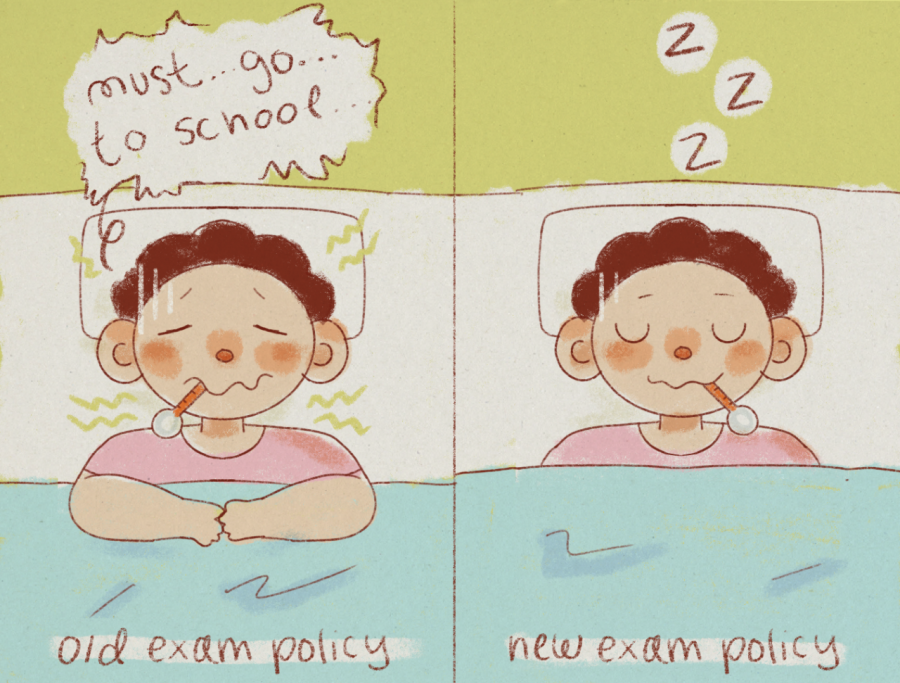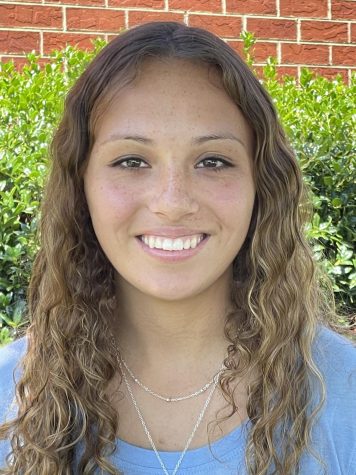New exam policy changes alter requirements for taking teacher-made exams
Image courtesy of Reilly Calvert
Due to the new exam policy change, absences are not taken into account when determining whether a student will have to take a teacher made exam. This allows students to rest easy knowing that their absences will not count against them.
December 6, 2021
As of the beginning of November, one facet of the normal exam policy has been altered for all of Forsyth County. In the years before the COVID-19 pandemic, both the absences and the letter grade a student earned in a specific class determined whether or not the student could be exempt from a teacher-made exam.
This year however, only a student’s letter grade, which must be a C or above, determines whether they are eligible for exemption. These changes were made in order to address concerns involving absences resulting from students having to quarantine during the COVID pandemic.
“For this year, due to the mandatory quarantines that students have had to go under… the attendance portion will not count for this school year,” said instructional assistant principal Brent Atkinson.
Whenever a student contracts COVID-19 or is exposed to the virus, they must self-quarantine for 10 days, resulting in many missed days of school and many “in class absences.” Enough of these absences, and the student, regardless of their high letter grade or lack of control of the situation, is forced to take the teacher-made exam.
Punishing students who are performing well academically for a situation they can’t control does not seem fair. A district-wide poll conducted in September concluded that a great majority of teachers agreed to waive the attendance portion of the exam policy, Atkinson said. That is why the district made this change for all high schools in the county.
“According to the district, they said 85 percent of the respondents elected to waive attendance for this school year,” Atkinson said. “I think that’s because a lot of people felt like it’s kind of unfair that we’re telling somebody to go home; they can’t come to school, but we’re also saying… you still have to take your exam.”
Another reason the district adjusted the requirements was because there were fears that students would be dishonest about their health just so that they would not have to miss school, therefore putting many others at risk as well.
“I think that was a piece of it too,” Atkinson said. “They didn’t want people coming to school sick just so they could be exempt, causing more people to get sick.”
The classes that are exempt from this new change and also from the original guidelines include any class with a state-mandated exam. The policy is district level, not state, therefore, classes that fall under the categories of EOC and some CTE classes experience no changes.
Many students are enthused about the new policy change, especially if they’ve gotten sick during the school months or are prone to accumulating lots of absences for various reasons.
“I feel like the changes are very helpful because when I was sick and had to get a COVID-19 test, I was not losing my chance to not have to take some of my final exams,” said sophomore Collin Capriola.
However, there are possible negative repercussions associated with the new exam policy change. If the number of absences a student has doesn’t affect whether they have to take the exam or not, what’s stopping a student with an A in a class from skipping school that day?
Several teachers have voiced concerns about this very issue, especially those who teach primarily upperclassmen who have easy access to transportation because of their age. While Atkinson believes such instances will not be as common as teachers fear, there’s no way of knowing yet.
“It is unknown. We don’t know what will happen,” Atkinson said.
There will most likely be instances in which this does happen though, knowing the nature of high school students.
“I think there will be some incidents where that [students skipping] will take place; some students will think, ‘Huh. I’ve already got a 94 and if I don’t come to school today I still don’t have to take my exam,” Atkinson said. “I do think there will be some people who take advantage of it.”
Foreign language department head and Spanish teacher Scott Larson agrees with Atkinson regarding student’s motivation to attend classes following the policy change.
“I would say the only change in behavior we could possibly fear is the fact that they might not come to school as often,” Larson said. “Now that the absences won’t count, hopefully it won’t change their desire to come to school.”
The exam policy changes will most likely last for only the 2021-2022 school year, unless the threat of COVID-19 worsens. Once the number of students getting sick and having to quarantine dwindles, so will the need for the policy change.
“I would say that if everything stays the same and if we’re still doing 10 day exclusions, I would think that we’d revisit it,” Atkinson said. “If COVID-19 is gone and no one’s getting sick anymore… I would think that we’d revert back to the old policy.”
While it seems that the new exam policy change is not here to stay, it certainly benefits students today, and people remain hopeful that by the next school year it won’t be necessary at all.


